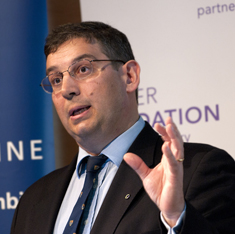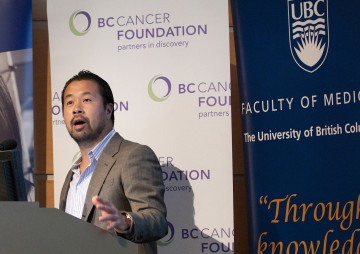Scientists at the UBC Faculty of Medicine and the BC Cancer Agency have discovered breast cancer genes that could change the way the disease is diagnosed and provide the basis for new treatments.
The team at UBC and the BC Cancer Agency, in collaboration with Cancer Research UK’s Cambridge Research Institute and Manitoba Institute of Cell Biology at University of Manitoba, analyzed the DNA and RNA of 2,000 tumour samples taken from women diagnosed with breast cancer between five and 10 years ago. The sheer number of tumours mapped allowed researchers to spot new patterns in the data.
The study, published online April 17 in Nature, is the largest global study of breast cancer tissue ever performed.
With that data, the researchers were able to:
- Classify breast cancer into 10 subtypes grouped by common genetic features, which correlate with survival. This new classification could change the way drugs are tailored to treat women with breast cancer.
- Discover several completely new genes that had never before been linked to breast cancer.
- Reveal the relationship between these genes and known cell signaling pathways – networks that control cell growth and division. This could pinpoint how these gene faults cause cancer, by disrupting important cell processes
“This is a major step forward in building the genetic encyclopedia of breast cancer and in the process we’ve learned there are many more subtypes of breast cancer than we imagined,” said study co-lead Sam Aparicio, a Professor in the Department of Pathology and Laboratory Medicine, and the BC Cancer Agency Chair of Breast Cancer Research. “The size of this study is unprecedented and provides insights into the disease such as the role of immune response, which will stimulate other avenues of research.”
This is the second major breakthrough announced by BC Cancer Agency scientists in as many weeks. On April 4, a team led by Dr. Aparicio announced the decoding of the genetic makeup of the most-deadly of breast cancers, triple-negative breast cancer.
Similar to that announcement, this investigation identified genes that were previously unknown to be linked to breast cancer and makes it clear that breast cancer is an umbrella term for what really is a number of unique diseases.
While the research is unlikely to benefit women who currently have breast cancer, it substantially advances how scientists approach further research and clinical trials by providing them a springboard to develop new treatment options and drugs targeted to specific genes. In the future, this information could be used by doctors to better tailor treatment to the individual patient.
Dr. Aparicio’s collaborators at UBC included Sohrab Shah, an Assistant Professor in the Department of Pathology and Laboratory Medicine and a Scientist at the BC Cancer Agency, and Stephen Chia, an Assistant Professor in the Department of Medicine and an oncologist at the BC Cancer Agency.
“We have known for a long time that breast cancer is made up of different subtypes,” Dr. Shah said. “Based on computational analysis of precise genomic measurements of 2,000 samples, our study provides a further subdivision of the breast cancer population into well-defined groups with different clinical behaviours. This provides a molecular scaffold upon which to develop tailored treatment strategies and identifies new cancer genes to target in future therapeutic development.”
The research was carried out in collaboration with institutions in Canada, the U.K., the U.S. and Norway, including the University of Cambridge, Oslo University Hospital, the University of Cambridge, the University of Manitoba and the University of Southern California.

